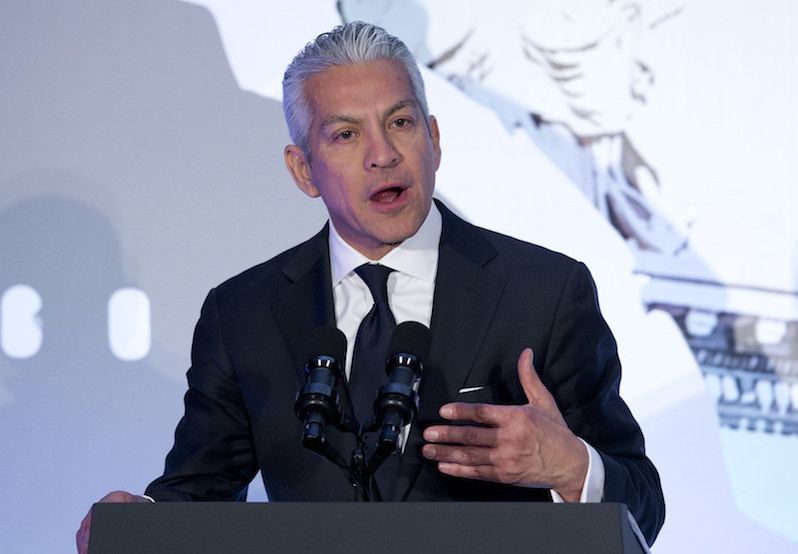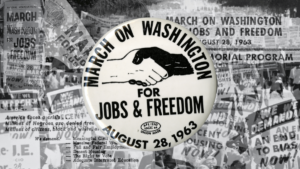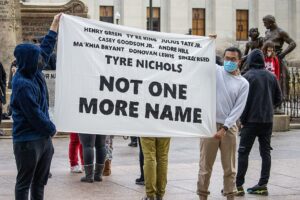White House Insider Javier Palomarez Is Not the Hispanic Community’s Martin Luther King Jr.
Once an outspoken critic of Donald Trump, the U.S. Hispanic Chamber of Commerce CEO now may be a misguided opportunist in the president’s national diversity coalition. U.S. Hispanic Chamber of Commerce President and CEO Javier Palomarez at the organization's 2014 legislative summit in Washington, D.C. (Carolyn Kaster / AP)
U.S. Hispanic Chamber of Commerce President and CEO Javier Palomarez at the organization's 2014 legislative summit in Washington, D.C. (Carolyn Kaster / AP)
By Bryan Betancur
U.S. Hispanic Chamber of Commerce President and CEO Javier Palomarez at the organization’s 2014 legislative summit in Washington, D.C. (Carolyn Kaster / AP)
Can one person speak on behalf of the Hispanic population in the United States, a diverse community that encompasses all classes, races and levels of education? U.S. Hispanic Chamber of Commerce (USHCC) CEO Javier Palomarez has claimed that right, both before the last presidential election as an outspoken critic of Donald Trump and now as a member of Trump’s national diversity coalition.
In a recent episode of the podcast “In the Thick,” Palomarez spoke to co-hosts Maria Hinojosa and Julio Ricardo Varela about his new role in the Trump administration. Only months after publicly calling Trump a “buffoon” and accusing the then-presidential candidate of “making an absolute mockery” of the election process, Palomarez spoke in a much more nuanced tone and highlighted the personal importance of answering Trump’s call to “shoulder the burden” and serve the Latino community.
Palomarez was forthcoming in addressing the concerns his cooperation with the Trump administration has raised. However, his responses throughout the interview spurred many more questions about his role as a White House insider and, on a larger scale, the place of minority groups within an administration that continues to characterize Latinos and immigrants as threats to this country’s security and economic well-being.
Considered in broad strokes, there is much to commend in Palomarez’s stance on immigration. Palomarez, the son of Mexican migrant workers, expressed solidarity with the Latino immigrant community by describing himself as “the poster child” of the Hispanic who “some in this administration would like to run out of this country.” As he did during the election cycle, when he called Trump’s views on immigration reform “the argument of a child and fearmongering at its worst,” Palomarez criticized calls for mass deportation on “In the Thick.” He pointed to the negative repercussions of Alabama’s stringent immigration policy as proof that “draconian immigration laws” are shortsighted and deleterious to the economy. He cited the $668 billion Hispanic-owned businesses contribute annually to the U.S. economy and spoke of the positive impact immigrants have long had in this country as entrepreneurs. He also advocated for the continuation of the Deferred Action for Childhood Arrivals (DACA) program and lamented what he described as skewed representations of Latinos in the media that do not take into account Hispanic businesspeople.
“My community is driving economic development,” Palomarez affirmed, the possessive pronoun emphasizing his identification as a voice of U.S Hispanics.
READ: Immigration Is Fueling Innovation in Silicon Valley
But on closer examination, Palomarez’s rhetoric reveals inconsistencies. Throughout the “In the Thick” interview, he cloaked his arguments about immigration and other aspects of the Hispanic experience almost exclusively in economic terms. A commercial consideration of social policy can be expected from a successful businessman who heads an organization that represents more than 4 million Hispanic-owned businesses. However, Palomarez focuses on business to the exclusion of civil rights advocacy and insists that a strictly economic perspective is the only way to bring the concerns of the Hispanic community before the new administration. This type of strategy is not new for Palomarez, who has claimed that he brought the Hispanic Chamber of Commerce out of economic near-collapse in part by recognizing the importance of moving past a civil rights focus.
Nonetheless, it is troubling to hear a man who purports to represent the Latino community associate commercial policy with his own privileged place in the White House—while dismissing those who espouse a civil rights approach to policy as too far removed from power. Palomarez argued that “you can’t change the game from the sidelines” and suggested that “there are enough cooks in that kitchen,” effectively distancing himself from social demonstrations and minimizing the efficacy of these and other means of protest in achieving positive change.
Oddly, after arguing that he no longer needed to work from the margins, Palomarez then likened his experience as a White House insider to that of Dr. Martin Luther King Jr. Referencing Trump’s history of offensive rhetoric, Palomarez asserted that his new advisory role paralleled King’s efforts to represent the African-American community before a president who frequently used the “N-word” in his presence. The analogy was as startling and bold as it was hypocritical and poorly conceived.
For one, King spent as much time risking his life at the front of protest marches as he did talking policy in the White House. He never would have downplayed the power of demonstrations or argued that he was not needed on the sidelines. Moreover, for all the derogatory language he may have used, Lyndon B. Johnson was committed to working with King to pass civil rights legislation. He was an ally to King in a way antithetical to Palomarez’s own relationship to Trump, who just six months ago refused to attend a town hall sponsored by the USHCC and accused Palomarez of trying to benefit financially from the media’s coverage of the then-candidate’s statements regarding immigration.
Palomarez’s remarks reveal the thoughts of an individual who has given himself credit before securing impactful reform on his community’s behalf. He claimed a role in Trump’s softening on some immigration policy, stating that the president could have ordered all DACA recipients deported but chose not to, due in part to Palomarez’s advocacy on their behalf. Ironically, Palomarez underscored the importance of this achievement at a time when Immigration and Customs Enforcement (ICE) is continuing to arrest Dreamers and threatening them with deportation.
When the “In the Thick” co-hosts pointed out this discrepancy, Palomarez insisted that these incidents were in the minority and failed to state how he planned to address the continued arrests of Dreamers with the administration. Nor did he speak about other pressing issues directly related to immigration, such as the building of a wall along the Mexican border or the state of U.S. involvement with NAFTA. These topics could have given him an opportunity to drive home the impact of his involvement with the White House. Instead, the focus remained on the importance of business rhetoric in political dealings and on his “call to serve” his community.
Palomarez proposes talking about immigration “without the emotional piece,” but to what extent is this possible? Can one exalt the immigrants who founded AT&T and Bank of America while ignoring the emotional consequences of separating families or falling prey to hate and discrimination?
I spoke with Julio Ricardo Varela about the complex implications of Palomarez’s political strategy. Varela expressed admiration for the CEO’s economic line of thinking but also wondered if a strict either/or stance with regard to Latino political engagement loses sight of a fundamental piece of the community’s identity. Varela described immigration as integral to the Hispanic consciousness—a historical, collective experience that may not constantly be in Latinos’ minds but is certainly always in their hearts. For Varela, the challenge for someone in Palomarez’s position is to prove to Hispanics that his rhetoric and decision to cooperate with the administration is an effective form of resistance and not a symptom of having forgotten one’s community.
In a 2015 interview with Varela, Palomarez cautioned the GOP primary candidates to avoid “the fatal flaw of ignoring Hispanics through the primaries and then planning to belatedly turn on the charm … during the general election.” As much as Palomarez claimed at that time that Latinos would not tolerate “last-minute Hispandering” on the part of any candidate, his acceptance of a place in the diversity coalition has not yet proven to be anything but that.
What influence can a Hispanic have in a White House that redirected attention from the collapsed American Health Care Act by immediately resorting to the narrative of the violent immigrant? What happens when an advocate of Hispanic business allies himself with a president who has a documented history of shortchanging small business owners and referring to Latinos almost entirely in the context of crime and security issues? Thus far, it has led to promoting and celebrating a roundtable of Latina entrepreneurs that put forth no concrete policy proposals. Such actions, however, come across as legitimizing propaganda—more Hispandering—and not as signs of progress.
Will Palomarez give Hispanics a legitimate place at the policy table? Or, as attorney and columnist Raul A. Reyes feared in a piece published in January in The Hill, has the Latino community lost “an influential, once credible voice”? Reyes places the onus on Palomarez to prove that he remains an ally of the Latino community and that his decision to join the Trump administration was not the product of misguided opportunism.
Who can speak for Hispanics? Given his contradictory rhetoric and downplaying of a crucial part of the Hispanic experience, that person is not Javier Palomarez—not until he can present proof that he will advocate for vulnerable Latinos and achieve demonstrable gains for his community in the face of an administration that continues to promote xenophobic sentiment.
Bryan Betancur is an assistant professor of Spanish at Furman University.
Your support matters…Independent journalism is under threat and overshadowed by heavily funded mainstream media.
You can help level the playing field. Become a member.
Your tax-deductible contribution keeps us digging beneath the headlines to give you thought-provoking, investigative reporting and analysis that unearths what's really happening- without compromise.
Give today to support our courageous, independent journalists.








You need to be a supporter to comment.
There are currently no responses to this article.
Be the first to respond.